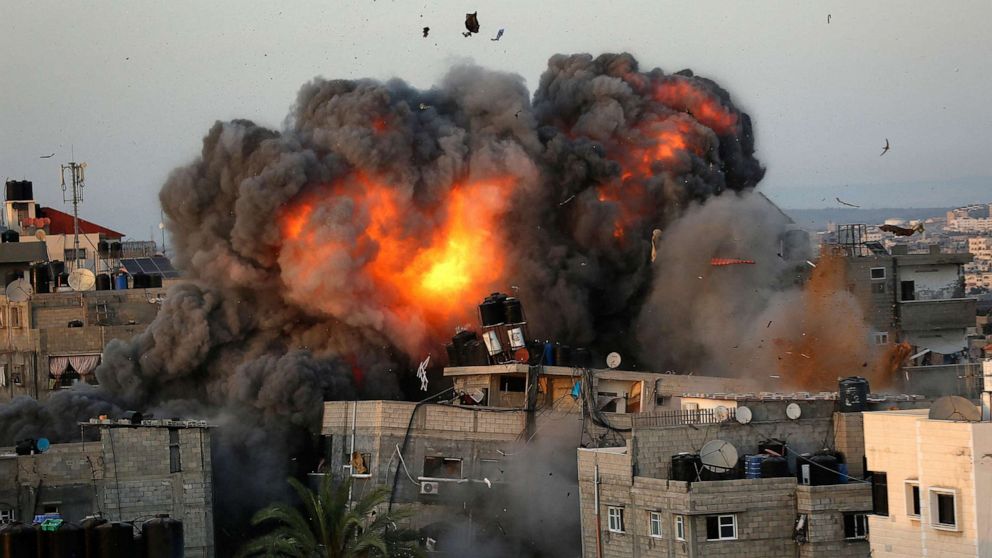Health authorities in Gaza have been struggling to get at least 1,200 people out of the rubble.
Qatar’s Prime Minister and Foreign Minister Sheikh Mohammed bin Abdulrahman Al Thani is heading to Oman on Tuesday for an emergency Gulf Cooperation Council meeting on the ongoing war in Gaza, where Israeli bombardment killed more than 2,808 Palestinians.
Sheikh Mohammed’s participation at the meeting was announced by Ibrahim Al Hashmi, the Director of the Media and Communication Department at Qatar’s foreign ministry, during a weekly press briefing in Doha.
“This is to discuss the situation in the Palestinian territories and Israel,” Al Hashmi told the press.
The GCC meeting comes amid international efforts to permanently halt the latest Israeli bombardment of the besieged Gaza Strip that has caused a major humanitarian catastrophe while displacing at least one million of the population.
Since the start of the bombing campaign, the Israeli occupation forces (IOF) have killed over 2,808 Palestinians, including at least 1,000 children, and wounded more than 11,000 others.
However, the figures are only expected to rise as Israel continues its relentless bombardment of the city.
At least 64 percent of the Palestinians killed by the Israeli air strikes are women and children, according to the Palestinian news agency, Wafa.
Gaza’s 2.3 million population is currently trapped in the besieged enclave without access to food, water and electricity due to the “complete blockade” on the strip by Israel.
The IOF destroyed at least 3,731 residential buildings, including 10,500 housing units, while partially damaging 10,000 others and putting 18 schools out of service, according to Wafa.
Palestinians in Gaza were instead forced to take shelter in open parking spaces, inside vehicles or schools operated by the United Nations Relief and Works Agency for Palestine Refugees (UNRWA).
Since last week, Qatar has been in close contact with key international partners— namely the US, the United Kingdom, Iran, Turkiye, Jordan, Saudi Arabia, among others—in an effort to explore an end to the escalations in Gaza.
“The only way to reach a peaceful solution is to open all contact channels with all partners and concerned parties through cooperation[…] Qatar deeply believes that mediation, dialogue are very important and this is part of our foreign policy,” Qatar’s foreign minister told the press in Doha on Friday.
Race against time
Countries in the region and their Western partners have been scrambling to seek an end to the Israeli bombardment in Gaza while exchanging views on possible mechanisms to enable the safe entry of aid to the blockaded enclave.
Last week, Israel imposed a complete siege on the already blockaded city, completely cutting off its access to food, electricity, and water. The move was widely slammed by regional countries, including Qatar, as a form of “collective punishment”.
Much of the regional efforts have been centred on the opening of the Rafah Crossing, the only portal through Gaza, after it shut down last week due to Israel’s attacks.
The IOF attacked the crossing yet again on Monday as hundreds of Palestinians eagerly awaited to exit the besieged enclave. The Israeli airstrikes have damaged much of the crossing’s infrastructure from the Palestinian side, though it is operational from the Egyptian side.
On Monday, Egyptian Foreign Minister Sameh Shoukry revealed that his country sought to keep the Rafah crossing open but Israel had prevented it from its side.
In the meantime, tonnes of foreign aid have been stacking up in trucks in Egypt’s Sinai awaiting to enter Gaza through the Rafah crossing. Egypt had called on potential donors to instead deliver aid to Egypt’s Al Arish International Airport, where other aid flights have already landed.
On Monday, Qatar joined the international community in delivering aid to Gaza by dispatching the first of three Qatar Emiri Air Force flights to Al Arish International Airport in the Sinai peninsula, carrying 37 tonnes of aid.
Medics in Gaza are currently in a race against time to treat the injured with a lack of medical resources and almost a complete absence of water and electricity. The United Nations had warned on Monday that Gaza’s hospitals are losing the last remaining fuel reserves, with backup generators shutting down.
Health authorities in Gaza have also been struggling to get at least 1,200 people out of the rubble.
“So many times medics say they hear victims scream, but they cannot do anything about it,” Mohammed Abu Selmia, general director of Shifa Hospital, told the Associated Press on Tuesday.







